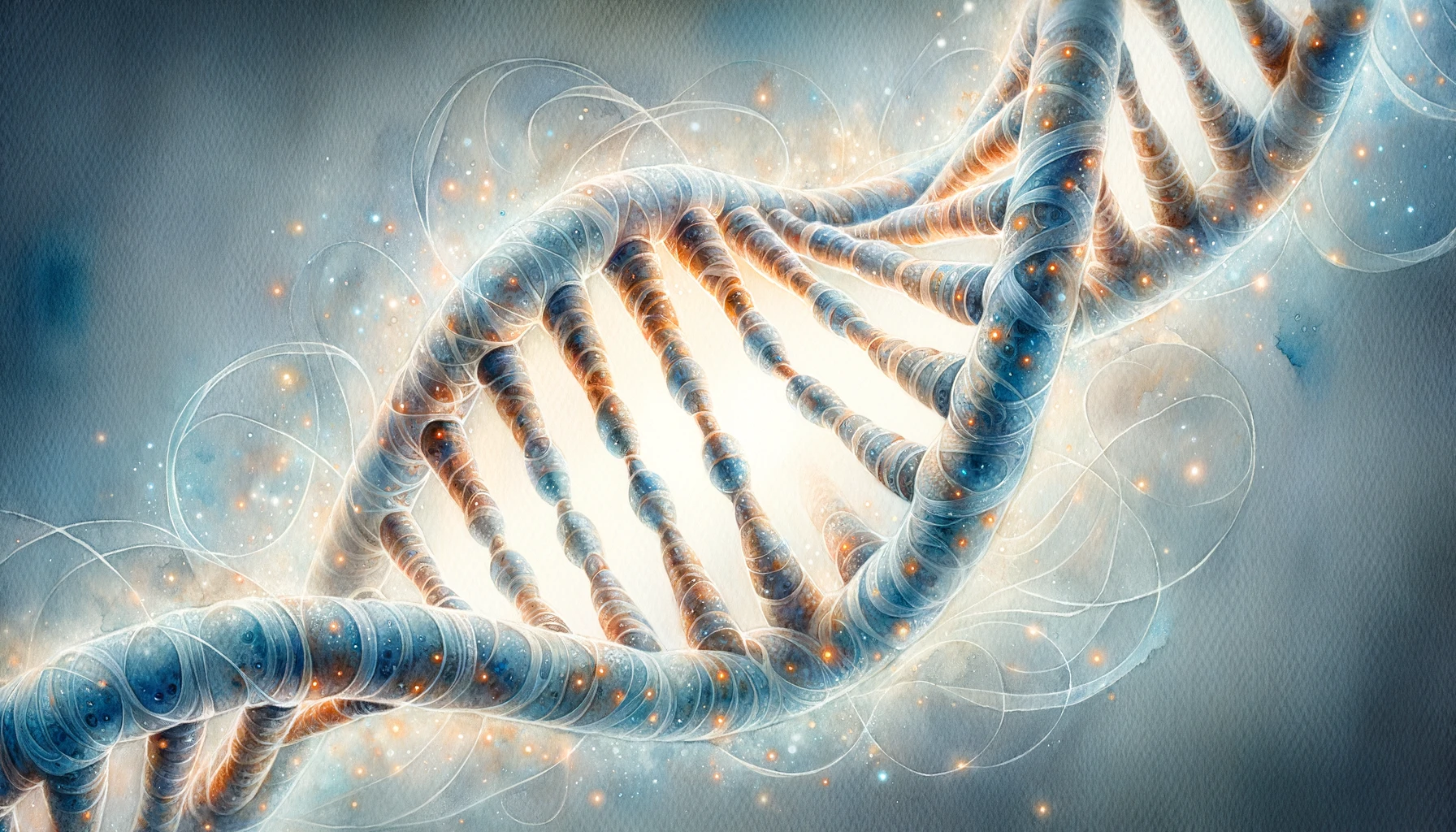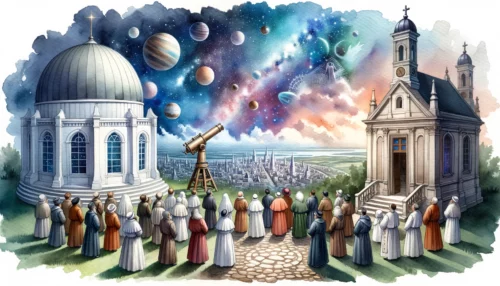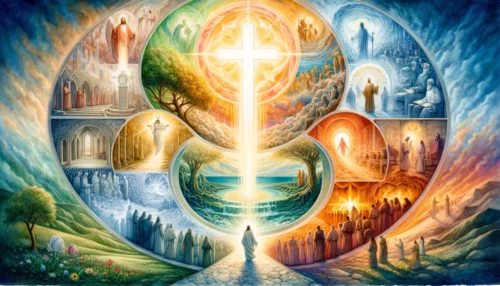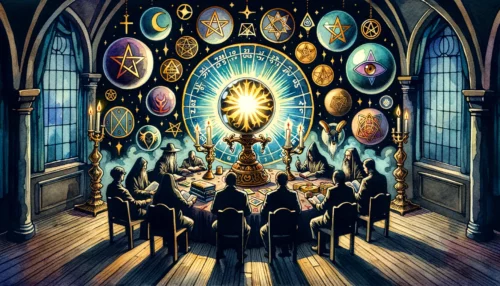The miracle of life is a subject of awe and intrigue. The closer we look, the more we witness its beautiful complexity, a design so intricate that it seemingly surpasses human understanding. In this rich tapestry of existence, could we be discerning evidence of an intelligent designer, hinting at the grand narrative of biblical creation?
Unraveling the Complexity of Life
Life’s complexity can be appreciated in the workings of a single cell. Consider the nucleus, mitochondria, ribosomes, and the myriad other structures, each performing a vital function, collaborating in perfect harmony to sustain life. The marvels of cellular machinery, the flawless replication of DNA, the intricate orchestration of protein synthesis – these phenomena, fascinating in their details, present a picture of staggering complexity.
The human body, made up of trillions of these cells, each tailored to perform a specific role, yet sharing a uniform genetic code, adds another layer to this complexity. A network of neurons in the brain, countless biochemical reactions in our cells, the precision of the circulatory system, and the adaptability of our immune system; these and many other aspects make us ponder on the sophisticated intricacy of life.
In the realm of ecology, consider the interconnectedness of life forms. From the delicate balance of ecosystems to the migratory patterns of birds, from the symbiotic relationships between species to the transformation of energy within food chains – there’s a harmony in nature that suggests an intricate and purposeful design.
The complexity of life doesn’t stop at the boundaries of Earth. The positioning of our planet, the precise tuning of physical constants that allow life to exist, the predictable patterns of celestial bodies; these elements provide the perfect cosmic stage for life’s drama to unfold.
The Genesis account, while it does not detail the intricacies of biology or physics, underlines that creation was a thoughtful and purposeful act (Genesis 1-2). Every form of life, every cell, every atom, is the result of a meticulous process that has a design and a Designer behind it.
Life’s complexity reveals how intertwined and intricate natural systems are, from cellular to cosmic levels. The biological wonders within a cell, the unparalleled human body, the interplay of life forms within ecosystems, and the fine-tuned cosmic settings all indicate a thought-out design. The Genesis narrative supports this view, highlighting the thoughtful and purposeful nature of creation, underlining the role of an intelligent Designer in shaping every form of life and the universe as a whole.
Correlating Life’s Design with Divine Intelligence
Delving into the layers of life’s design, it’s natural to speculate about the mind behind it. The level of precision, the harmonious coordination, the seemingly purposeful interaction, and the resilient adaptability we observe in nature seem to indicate not just a designer, but an intelligent one.
Consider the way a bird knows when and where to migrate, how a seed grows into a tree, or how the human immune system fights off invaders. These instances demonstrate a level of intelligence that’s far beyond mere coincidence. They imply a plan or blueprint – an intelligent design. And for those of us with faith, this intelligence is God’s.
The Bible has always affirmed the presence of an Intelligent Designer. The Psalms exclaim that the heavens declare the glory of God, and the skies proclaim the work of His hands (Psalm 19:1). In the New Testament, Paul emphasized that God’s invisible qualities – His eternal power and divine nature – have been clearly seen, being understood from what has been made (Romans 1:20).
It’s not just the grand scale of things that speaks of God’s intelligence. Even the smallest details of creation reveal a well-thought-out plan. The way DNA codes for proteins or how photosynthesis enables plants to convert sunlight into food. These mechanisms speak of a Designer who is not just intelligent, but also incredibly creative and innovative.
Intelligence is not merely about knowledge or skills. It also involves wisdom and understanding, the ability to discern what is good and beneficial. The biblical God embodies these attributes. He created the world with wisdom, laying the earth’s foundations with understanding (Proverbs 3:19). He crafted a world that’s not just functional and efficient, but also harmonious and beautiful.
The intricate and sophisticated design evident in life and the universe echoes the existence of an Intelligent Designer. The Bible points to this Designer as God, declaring that His handiwork is evident in everything, from the grandeur of the cosmos to the minutest biological details. It underlines that God’s intelligent design is not just about technical brilliance, but also reflects wisdom, understanding, creativity, and a keen sense for aesthetics. God’s intelligence, as observed through His creation, is a testament to His profound knowledge, immense creativity, and timeless wisdom.
The Bible and the Testimony of Intelligent Design
From the very first verse of the Bible, the assertion of an Intelligent Designer is clear. Genesis opens with the proclamation that God created the heavens and the earth (Genesis 1:1). The text goes on to depict God as a hands-on designer, meticulously crafting every part of creation, from light and darkness to land and sea, plants, animals, and ultimately humans.
The biblical testimony of intelligent design goes beyond the creation narrative. The Psalms are filled with the praises of the natural world as a testament to God’s handiwork. The Apostle Paul echoes this sentiment, making it clear that God’s handiwork in creation is an evidence of His divine nature and eternal power (Romans 1:20).
The Bible does not explicitly use the term ‘intelligent design’, but the concept is implicit throughout. It portrays God as a purposeful, intentional designer. His actions are not arbitrary but carefully planned and executed, showing wisdom and understanding (Proverbs 3:19). This divine intelligence is also reflected in the moral and ethical design of the universe. The laws given to Moses, the teachings of Jesus, and the writings of the apostles all provide a framework for human behavior, pointing to an Intelligent Designer who cares about morality and righteousness.
This biblical perspective lends meaning to the complexity and intricacy we observe in the natural world. It tells us that the intelligence behind life’s design is not impersonal or indifferent. Rather, the Designer is personally involved with His creation, caring for it and setting a purpose for it. This is evident in God’s ongoing involvement with the world, as He sustains and cares for all that He has created (Colossians 1:17).
The Bible upholds the testimony of intelligent design throughout its narrative. It introduces God as the Intelligent Designer right from Genesis, reaffirming this through the praise-filled Psalms and the teachings of the apostles. It presents a Designer who’s not only skilled and knowledgeable but also wise and understanding. The Bible’s portrayal of God’s intelligent design extends to moral and ethical dimensions, further highlighting the Designer’s personal concern and purposeful involvement with His creation.
Witnessing the Divine Hand in Life’s Tapestry
The intricacy of life and the cosmos paints a vivid picture of a meticulous and intelligent Designer, a portrayal that aligns with the biblical narrative. The complex web of life, the grandeur of the cosmos, and the profound wisdom encoded in moral and ethical structures all point towards an intelligent and purposeful Designer.
Reflect on these questions:
- How does observing the complexity of life deepen your appreciation of God as the Intelligent Designer?
- In what ways can understanding the concept of intelligent design strengthen your Christian faith?
- How can the evidence of intelligent design in the natural world influence your daily life and actions?
The Intelligent Designer of the cosmos is the same God who knows us intimately, who is involved with His creation and who holds the universe in His hands. This understanding illuminates our faith, not as a mere belief system, but as an awe-filled recognition of our Creator’s divine intelligence, wisdom, and purposeful design. Our faith is enriched, our sense of wonder is deepened, and our relationship with God becomes even more meaningful when we see His intelligent handiwork in the world around us.














